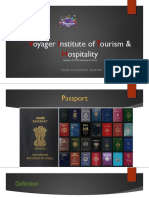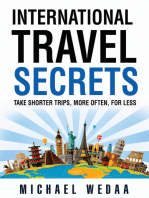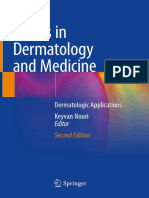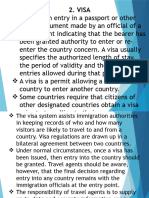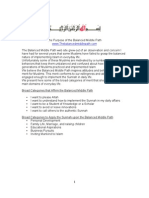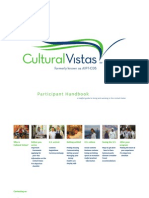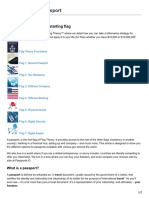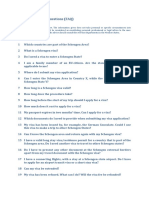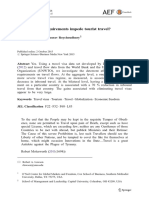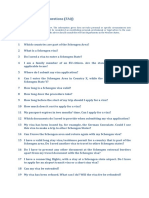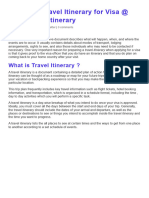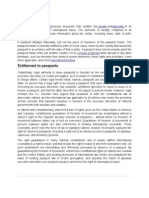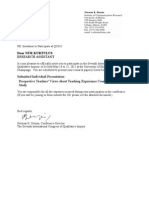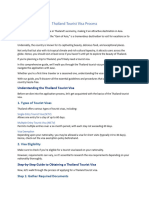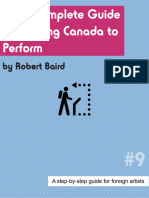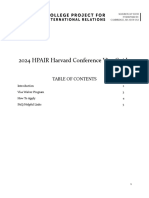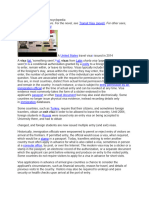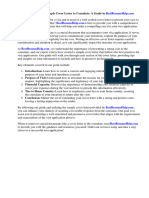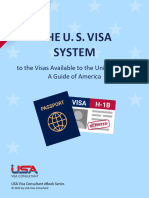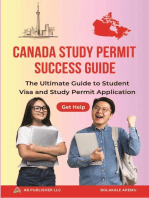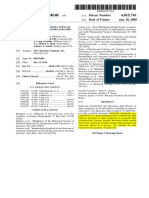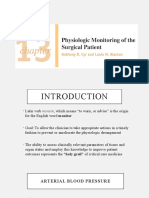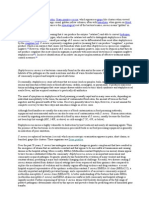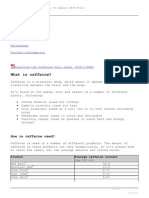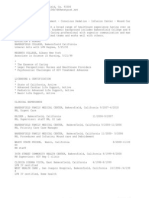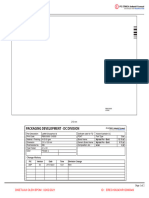Guide To International Travel Documents
Guide To International Travel Documents
Uploaded by
TravefyCopyright:
Available Formats
Guide To International Travel Documents
Guide To International Travel Documents
Uploaded by
TravefyOriginal Title
Copyright
Available Formats
Share this document
Did you find this document useful?
Is this content inappropriate?
Copyright:
Available Formats
Guide To International Travel Documents
Guide To International Travel Documents
Uploaded by
TravefyCopyright:
Available Formats
International Travel Documents
Travefy Inc. 2015
International Travel Documents
Table of Contents
Chapter
Page
1. Introduction
2. What is a Travel Document?
3. International Travel
4. Passport
5. Visa
12
6. Vaccination
15
8. Conclusion
19
9. The Ultimate International Travel Checklist
20
About Travefy
Group Travel is complicated! Travefy makes it easy.
Travefy is a tool that solves the coordination headaches of group travel. Through
Travefy users can collaborate on trip itineraries, book travel deals, and manage shared
expenses. Learn more at Travefy.com!
About the Authors
Yem Ahiatsi is the author of International Travel Documents and the name behind many
posts on the Travefy blog. Yem is a graduate alumnus of the University of NebraskaLincoln, a Fulbright fellow, and a globetrotter.
Editorial and visual support was provided by David Chait & Scott Rutz.
Travefy Inc. 2015
International Travel Documents
Introduction
What qualifies as a travel document? Which ones are essential to travel
the world and which are (always) good to have? Are there any
documents that act as master keys to the worlds most popular
destinations? Where can I find more information about my passport?
What are the best practices when handling the visa process for travel
groups?
The travel industry has been hurt by the economic and sociopolitical crises since
2000. However, 2010 was a record year for the airline industry and 2012 saw more
than one billion trips, according to the United Nations World Tourism Organizationi.
While more and more people are crossing borders, there doesnt seem to be a joint
effort to harmonize travel or country entry requirements. What it takes to get into the
US is different from what is needed to enter a neighborly country like Canada or Mexico.
Many travelers go through the visa or passport acquisition process without any other
information than that given on the spot by officials. You can guess how long and
misguiding the bureaucratic processes can be. Others try to hack their way through by
crowdsourcing tips and tricks online from travel blogs and forums. Is it more
effective? You be the judge.
Working in the group travel industry, one has the duty to answer every question
consumers have. As so, one learns soon enough that it takes a combination of official
information and experienced-travelers ideas to avoid the most common pitfalls of
travel. Among these, securing travel documents effectively is a major concern.
Thus, we put together this eBook together to serve as a guide when searching,
identifying, and securing essential travel documents. The information you will find in
this eBook will be mostly official instructions clarified or improved as often as possible
with input from travelers, globetrotters, or professional of the travel industry.
This eBook follows the usual process one goes through to secure travel documents;
from acquiring a passport, to securing a visa, and meeting health requirements. As a
bonus, you will find at the end of this eBook, a travel document checklist to help you
make your international travel planning as smooth as possible.
Travefy Inc. 2015
International Travel Documents
Also, we will try to have an approach as universal as possible in order to be useful to
every travel regardless of their nationality, departure origin or destination.
Travefy Inc. 2015
International Travel Documents
What is a travel document?
A travel document refers to an identification document issued by a government or an
organization to facilitate the movement of individuals across country bordersii.
However, note that not all identification documents are acceptable everywhere in the
world. It is your responsibility as a traveler to check with your destinations officials
and official tourism guides to make sure that you meet their requirements.
The most common form is the passport, but there are also other forms, some less
popular, that will grant safe entry within a countrys territory.
Types of travel documents
The passportiii often comes in the form of a booklet that serves as proof of nationality
for the bearer. The passport is also the travel document that grants visa-free access
to certain countries. Although the passport is the most widely accepted travel
document, Country officials will reject passports issued by nations they do not
recognize.
Laissez-passersiv are special travel documents issued by governments and certain
international organizations. These are issued often in special circumstances, such as
for a stateless person, as emergency passport, or to grant access for humanitarian
reasons. A laissez-passer does not have to state any mention of nationality other than
that of the issuing authorities and they grant only restricted access and right of travel
to the holder.
Conventional or Refugee travel documents (or Titre de Voyage) are issued in
accordance with the UN Convention related to the Status of the Refugees of 1951. As
so, only refugees and stateless people can typically receive this passport-like
document.
The National Identification card could allow international travel. It is the case for
citizens of the member-countries of the European Union or the Economic Community
of West African States.
While these are the most common travel documents, travel is extremely difficult
without a visa or, often, vaccination records.
Also, you will find that many travel bloggers and companies online refer to travel
credit cards, travel insurances, and bookings as travel documents. While these items
Travefy Inc. 2015
International Travel Documents
are recommended, they are not required to gain entry into a country. Therefore they
wont be covered in this eBook.
Travefy Inc. 2015
International Travel Documents
International Travel
In general, these are the requirements for going in and out of a foreign country. The
following are common to, at least, the UK, the USA, and the Shengen (European
Union) area.
Passport validity
Blank passport pages
Tourist Visa Required
Vaccination
Currency Restrictions for Entry and Exit
Narcotic Restrictions
Tip: Make sure your passport and other travel documents dont expire shortly after
your trip. Russia for instance requires for all visa applicants to have a passport that is
valid for 6 months beyond the intended stay. Also, common over-the-counter pain
killers may be restricted in other countries and you wont be able to travel with themv.
All smart travelers must learn to effectively meet these requirements. Regarding travel
documents, it is time to learn the basics about passports, visas, and vaccination
documents.
Travefy Inc. 2015
International Travel Documents
Passport
A passport is a critical travel document. Still, sometimes, it is possible to reach some
destinations without it. Other times, you might have a passport but still wont be able
to travel with it due to its validity. How do you determine if your passport is necessary
and valid for a trip? How do you apply for (a new) one? Those are the questions that
we will answer in this section.
Do you need a passport at all?
As a general rule, keep in mind that international travel is not possible without a valid
passport. Therefore, if you do not have one, it will not hurt to apply for one as to have
it close at hand. Most passports have a validity period that range from 5 years to a
decade, giving you plenty of time to embark on many journeys. How do you know if a
passport is required to travel to your destination?
First, check the entry requirements for the destination country. Every country has its
own requirements and it would be inaccurate and misguiding to try to generalize.
However, note that countries that are part of economic communities tend to
harmonize entry requirements within the zone (i.e. the European Union.)
Second, check with your departure countrys authority for re-entry requirements. The
U.S. Department of State (DoS) warns that under the requirements of the Western
Hemisphere Travel Initiative (WHTI)vi, even American or Canadian citizens must
present a standardized document when trying to enter the U.S. borders. The rationale
behind this constraint is two-fold: secure the borders, and facilitate entry for citizens
and legal aliens.
Finally, you could use a third-party information resources to know the passport
requirements. For this search, the internet will be your best friend. For instance,
IATAs travel center has a web app with an effective search engine that tries to
estimate your requirements, not only for passports but also visa, and health.vii
However, keep in mind that the most accurate and updated information you can find
is that provided by country officials. Third-party apps, blogs, and other resources
give estimations, or information accurate at a certain point in time.
Travefy Inc. 2015
International Travel Documents
How to figure out if your passport is still valid for traveling
In most cases, the validity of your passport depends on the answers to the following 3
essential questions: 1) Is my passports expiration date close or past? 2) Do I have
enough blank visa pages? 3) Is my passport in a usable physical state?
Tip: If youre traveling by train, make sure you have enough pages in your passport to
account for all of the countries you will pass throughnot just for your destination.
1. Everyone needs to travel with a valid passport. Often it means that your passport
hasnt expired yet. However, other nations will only allow you access if your
passport has a certain validity period left. Some calculate this according to the
date of entry. However, other countries like all 25 Shengen (EU) countries will
require 3 months of validity beyond the estimated date of exit. In general, that
validity period is between 3 to 6 months.viii
2. As a general rule of thumb, know that you will need at least 2 blank visa / stamp
pages to travel. Some airlines will deny boarding if you do not meet this
requirement.
3. Normal wear is tolerated as long as the book cover and the personal data page(s)
are intact. The DoS travel webpage states the other conditions for passport
replacement include but are not limited to: water damage, significant tear,
unofficial marking on the data page, hole punches and missing visa page.
So you need a new passport
After assessment, you realize that you need a new passport. No sweat. If you start the
process early enough and arm yourself with enough patience and courtesy, you will
get your new passport in due time.
Again, the passport acquisition process differs from a country to another. To illustrate
some of the pitfalls and the best practices, we will focus here on the case of the US
passport. Chances are, some (if not all) of the steps described here will also apply to
you.
One quick note before applying for that new passport: if you are renewing because of
lack of blank visa pages, note that the US might issue 52-page (instead of the usual
Travefy Inc. 2015
International Travel Documents
28-page) passport to frequent travelers. Citizens can also apply to have extra pages
added into their passport book.ix
Renewal
A renewal request can be submitted by mail as long as special conditions are met.
These conditions include having a current passport that is less than 15 years of age, is
undamaged and submitted with the application.
Special cases
Americans applying for their first passport (without counting any that they may have
held as a minor), are required to submit the application in person. Same goes for
minor under the age of 16 which must also present themselves accompanied by both
parents, or legal guardians.
For a full listing of requirements and procedures, refer to the DoS travel page. It
remains the most up-to-date resource you can find online. You can also go to a
passport agency near you.
Passport tips and tricks
1. Start the process early. In the US, UK, and Canada, the application process time
can be between 3-6 weeks. For other countries, government workers might not be
as diligent.
2. Check for the availability of an expedited service. Some countries also offer their
citizens an overnight passport processing. In the US, it can cost as much as $100
additionally. A hefty fee for your procrastination or lack of organization.
3. Triple-check your application. Sometimes, you can save yourself a lot of hassle,
time, and frustration just by putting an extra attention to detail with filling out that
dreaded administrative form and accurately gathering the required documents.
4. Use a passport handling service. If you are just terrible with forms and document
processing. You can pay a specialized service to take care of it for you in order to
expedite the process. Briggs Passport & Visa Expeditors charge between $50-250
to get that passport in your hands faster.
Travefy Inc. 2015
10
International Travel Documents
5. Do NOT use a passport book previously declared as lost or stolen. It cannot be
stated enough. If you have declared a passport lost or stolen and then retrieve it,
you cannot and should not travel with it. In the best case, it will be unusable simply
because it has been cancelled. In the worst case, I hope you enjoy the time you will
spend explaining to authorities what you are doing traveling with reported stolen
travel documents.
Conclusion
The master key to the world is a valid passport. To figure out if your passport counts
as a valid travel document, contact resources in charge of travel in both your home
country and abroad.
Travefy Inc. 2015
11
International Travel Documents
Visa
A visa is often a document, a seal, or a stamp on a passport that grants the holder of
that passport, entry, exit and stay in a foreign country for a specific period of timex.
Some passports will grant visa-free movement into and out of some countries. Unless
it is the case, you will have to make the demand for a visa. When dealing with the visa
process, the first step is to figure out if you actually need one, then which type suits
your needs, and finally the proper process to secure it.
Do you need a visa?
Travelers should contact the nearest High Commission, Embassy or Consulate of the
destinations they plan to visit well in advance of travel. The goal is to figure out as
early as possible if whether or not you need a visa and what is the best way to secure
it.
Of course, there are also, as mentioned in the previous section, third-party services
that for gathering requirement information or facilitating the process. We mentioned A
Briggs and the AITA travel center for passports. There is also Visa HQ that has a web
appxi service for figuring out visa requirements by citizenship.
Again, remember that the best source of information is always the official one.
What type of visa do you need?
If it turns out that you do need a visa after all, your next step would be to figure out
exactly what type of visa would best suit your needs.
Believe it or not, there are more than 50 specific types of visas you could apply for
when coming to the US. Around the world, visas are usually classified by purpose:
immigrant visa or non-immigrant, transit, visitor.xii The classification could also be
based on duration of stay (short stay, visit, long stay, residence, etc.) or by method of
issuance (electronic, paper, on-arrival, etc.).
However in practice, most common types of visa around the world can be sorted into
4 sub-categories:
Transit Visa
Referred to as C-1 in the US, this visa allows you to transit the United States on your
way to a foreign final destination. It does not grant you entry in any way into the US.
Travefy Inc. 2015
12
International Travel Documents
However, without it, you wont be able to connect flights on the American soil. And you
run the risk of being returned to your point of departure.
Visitor Visa
This visa allows the holder to reside on a foreign soil for a predetermined amount of
time, usually, for leisure purposes.
Note that in the US, the B-type visas are for tourism (B-2), but also for business (B-1).
Student and Exchange Visitors
This type of visa is reserved for people who intend to study in a foreign country. This
should be their main occupation. In most cases, like in the US or the UK, you will have
to apply for a work permit even for part-time employment.
Americans make the distinction between visas for academic studies (F), visas for nonacademic or vocational studies (M) and visas for exchange students and visiting
scholars (J).
Other types of Visas
From spousal visa to asylum visa to visas issued to diplomatic, athletic, or artistic
personalities, these special types of visas take care of very specific cases for which a
foreigner will need entry into a country. Often it is for a longer period than the usual
visas.
Visa-free visitors
Some passports are more powerful than others in that they grant visa-free entry to
more destinations around the world. For instance, under the Visa Waiver Program,
citizens of 38 countries can stay in the US for up to 90 days without requiring a visa.
These countries include Brunei, Chile, Estonia, and the Republic of Malta, just to name
the lesser known.xiii
Where to apply for a visa?
Similar to how you need to contact officials of your home country to apply for or
renew a passport, but a visa can only be issued by the officials of the country you
intend to visit. Luckily, you dont have to deal directly with the government of those
countries, unless you are eligible for on-arrival visa.
Rather, contact official representations in your home country or country of residence.
Usually you will have to visit the nearest high commission, embassy or consulate of
Travefy Inc. 2015
13
International Travel Documents
the nations you will visit to gather information about the visa process and the
requirements.
When it comes time to submit your application, remember that, depending on the
countries, you could apply, online, by mail, or in person in one of their official
representations. There are also, just like for passport handling, third-party services
that will act as facilitators to expedite the visa application process.
Travefy Inc. 2015
14
International Travel Documents
Vaccination
From Black Death to Ebola, traveling has always contributed to the spread of the
deadliest pandemics. Moreover, unprepared travelers are not safe from country or
region specific diseases that natives have grown nearly immune to. For instance,
Malaria and Dengue can ruin travel to the southern hemisphere, highlighting the
significance of immunization.
All nations value the well-being of their citizens. To preserve it, most countries impose
some sort of disease-screening conditions as entry requirements onto their territory.
Sometimes, these health-related prerequisites even act, at times, as entry restriction
factors. For instance, it is the case for the countries who restrict entry for HIV positive
travelers: Russia, Australia, and Canada. For a comprehensive country-specific
informative database, please refer to hivtravel.org or aidsmap.com.
Therefore, not only must a traveler know about the health requirements or restrictions
enforced in the destination country, it is also your duty to research all about health
risks and immunization recommendations in order to prepare oneself accordingly.
Doing your research
The very first step is to research your destination thoroughly. During this process,
focus on the following points:
Vaccination requirements.
Contact your destinations officials to learn everything about the vaccinations,
immunizations, as well as other health-related precautions they expect from you. Even
with a valid passport and visa, you can be denied entry to a country if you fail to
provide significant proof that you are not a threat to local public health.
Immunization recommendations.
Sometimes, prerequisites to entry are not intended to keep natives safe rather than
the visitors. Still, some vaccines may not be required but always good to get in order
to protect yourself and the community at large.
Health advisories.
A smart traveler is an informed traveler. Vaccines are another form of passport to
world adventure in that they keep you healthy and able to enjoy yourself. To stay
ahead of the latest development or disease outbreaks, you should include in your
research health resources such as:
Travefy Inc. 2015
15
International Travel Documents
The World Health Organization (WHO). With more than 56 years of experience
dedicated to handling with international public health, this United Nations
specialized agency is dedicated to the attainment by all people of the highest
possible level of healthxiv; especially you!
The Centers for Disease Control and Prevention (CDC) and their Travelers Health
portalxv
Your local Health Center. If you are a student, the Universitys health center
should be qualified to advise you on potential health risks according to your travel
plans.
The International Association for Medical Assistance to Travelers (IAMAT)
The Department of States Smart Traveler Enrollment Program (STEPxvi). This
service from the bureau of Consular Affairs will even provide you with assistance as
well as travel alerts and warnings.
Also, travel blogs and forums are boundless sources of infos from past and milled
travelers like yourself. Their words of advice are always good to take as so: advice.
Preparing yourself
Know your vaccination status
First off, see a healthcare provider in order to assess your current vaccination status.
Because once you have figured out which vaccines are required, it is time to figure out
which you can or should take. For instance, if you are pregnant, breast-feeding or
have special conditions, it could be actually bad for you to get some vaccines.
Remember that if you plan to visit several countries during your trip, you have to
consider all the immunization requirements. Luckily enough, some of them will be the
same.
Find a travel clinic
The CDC advises to reach out to professional medical organizations to find a suitable
travel clinic. This is almost an obligation if yellow fever is among the potential diseases
Travefy Inc. 2015
16
International Travel Documents
you need to protect yourself against. Note that, only few authorized vaccine centers
provide shots against yellow fever. For the online directories of suitable travel clinics
in the US, visit the web portals of the International Society of Travel Medicine (ISTM)
and the American Society of Tropical Medicine and Hygiene (ASTMH). You can find
both resources via the cdc.gov/travel/find-clinic.
Tip: Some university clinics offer vaccinations for travel to the general public at a
much lower cost than private clinics.
Give yourself plenty of rest time
You need to give the vaccines at least 4 weeks to reinforce your immunization system.
That period could be longer if you need multiple vaccine doses. Plan to take the shot
way before the trip. A doctor will be the best expert as to the time the vaccines need
to take effect.xvii.
Tip: Some vaccinations must be given in multiple doses with several weeks between
each dose. Dont put off your vaccinations until the week before your tripit might be
too late and cost you a lot in rescheduling your travel.
Preparing your immunization documentation
It is your duty to provide valid certificates and proofs that you have gotten all required
vaccines.
The yellow card
If immunization to yellow fever is among the prerequisite to entry, then you should
have the famous yellow card also known as the International Certificate of Vaccination
or Prophylaxis (ICVP). Travelers can get it from any yellow fever vaccination center.
However, the yellow card serves as record of travel immunizations including the date
and doses of vaccines received, as well as medical exemptions. It can (and should)
also contain other personal medical information such as medications, prescriptions,
and known drug allergies.xviii
Medical Prescriptions
If you are on medication and/or are planning to travel with medication, you will be
strongly advised to take the official prescriptions as well as copies of such
prescriptions along with you. In fact, store these copies in the same case as the
medications. The rationale for this precaution is that what qualifies as controlled
substance, restricted drugs or narcotics, differs from one country to another. Some
Travefy Inc. 2015
17
International Travel Documents
common over-the-counter drugs in the US such as inhalers or pills containing
codeine, or pseudoephedrine are illegal elsewhere, such as in Japan.xix
Travefy Inc. 2015
18
International Travel Documents
Conclusion
With the right travel documents at hand, the world will be yours to travel and explore.
These documents are meant to identify you, register you as an authorized visitor, and
ensure that you comply with the public health measures in place in your host country.
Compliance with requirements and effectively securing travel documents will depend
on your ability to reach out to the competent authorities in order to gather the
relevant information. Such resources include the embassy and consular
representation of the countries you plan to visit, your own government travel
resources as well as official or expert information online.
While travelers will often find the most accurate or up-to-date information with official
sources, there are third-party services that will help with providing travel insights, or
expediting the passport, visa, and immunization processes.
Sometimes, you will hear people refer to travel health insurance, credit cards, and
other payment options as travel documents. After reading this eBook, you understand
that there should be a distinction between travel documents which identify a person
and allows them to travel- and travel essentialswhich are highly recommended for
every traveler to carry.
For more information on travel essentials, visit blog.travefy.com and be on the lookout
for our next eBook which will be dedicated to that matter.
Travefy Inc. 2015
19
International Travel Documents
The Ultimate International Travel Checklist
Research
Pick destinations I want to travel to
Check for travel advisories and warnings
Check for passport, visa, and health requirements
Passport
Passport is valid for every destination in my travel plan
Cover and identification page are in good shape
There are enough blank visa pages left
Expiration date is more than 6 months away
Get new passport
Research all the required documents specific to my status (first-timer,
renewal, special cases, etc.)
Prepare passport handling fees (nb: if you want expedited service or are
using a passport handling service, extra fees will apply)
Make passport request (by mail, online, or in person)
Visa secured
Inquire about visa requirements for all individual countries in your travel
itinerary.
Request visa
Health Precautions
Do your research
Make list of required and recommended vaccines
Make list of medication prescriptions
Get appropriate vaccines
Consult with medical professional for eventual vaccination exemptions
Schedule an appointment with a travel clinic
Prepare medical travel documents
Vaccination records and other medical proofs
Store authorized-for-travel medications with appropriate medical
prescriptions
Prepared for emergency
Enroll for STEP
Make backup of all travel documents
Share travel plans and itinerary with family, friends.
Travefy Inc. 2015
20
International Travel Documents
References
i
http://www2.unwto.org/publication/unwto-annual-report-2012
http://en.wikipedia.org/wiki/Travel_document
iii http://studenttravel.about.com/od/uspassports/f/what-is-a-passport.htm
iv http://www.jimena.org/wp_super_faq/what-is-a-laissez-passer/
v http://www.nhs.uk/chq/Pages/2593.aspx
vi http://www.cbp.gov/travel/us-citizens/whti-program-background
vii http://www.iatatravelcentre.com/passport-visa-health-travel-document-requirements.htm
ii
viii
ix
http://traveltips.usatoday.com/countries-require-six-months-passport-validity-100788.html
http://travel.state.gov/content/passports/english/passports/services/pages.html
http://travel.state.gov/content/visas/english/general/frequently-asked-questions/what-is-a-u-s-visa.html
http://www.visahq.com/citizens/
xii http://travel.state.gov/content/visas/english/general/all-visa-categories.html
xiii https://esta.cbp.dhs.gov/esta/WebHelp/ESTA_Screen-Level_Online_Help_1.htm#ta1
xiv http://www.who.int/entity/governance/eb/who_constitution_en.pdf
xv http://wwwnc.cdc.gov/travel
xvi https://step.state.gov/step/
http://www.vaccines.gov/travel/
xvii http://www.wikihow.com/Get-Immunizations-for-Traveling
xviii http://www.worldtraveltips.co/yellowcard.html
xix http://lifehacker.com/dont-bring-over-the-counter-medicine-when-traveling-in-1555480629
xi
Travefy Inc. 2015
21
You might also like
- Plantar Pressure Distribution MeasurementsDocument6 pagesPlantar Pressure Distribution Measurementschungkailun1No ratings yet
- Tylmans Theory and Practice of Fixed Prosthodontics 8th EditionDocument1 pageTylmans Theory and Practice of Fixed Prosthodontics 8th EditionChristine Hache100% (1)
- Credentialing Pathways For Aesthetic Medicine Practice in Pakistan 13th JUNE 2022Document14 pagesCredentialing Pathways For Aesthetic Medicine Practice in Pakistan 13th JUNE 2022tasawwur zahoorNo ratings yet
- Visa Secrets Revealed: How to Get a Visa to America, Canada, Europe, Australia and Other Foreign Countries: Guide to Life OverseasFrom EverandVisa Secrets Revealed: How to Get a Visa to America, Canada, Europe, Australia and Other Foreign Countries: Guide to Life OverseasRating: 1 out of 5 stars1/5 (1)
- V I T H: Oyager Nstitute of Ourism & OspitalityDocument59 pagesV I T H: Oyager Nstitute of Ourism & OspitalityNachiket Aradhye50% (2)
- International Travel Secrets: Take Shorter Trips, More Often, for LessFrom EverandInternational Travel Secrets: Take Shorter Trips, More Often, for LessNo ratings yet
- Homeopathic Self-Care - The Quick and Easy Guide For The Whole Family (PDFDrive) PDFDocument452 pagesHomeopathic Self-Care - The Quick and Easy Guide For The Whole Family (PDFDrive) PDFNimesh Patel100% (5)
- Lasers in DermatologyDocument558 pagesLasers in Dermatologytania100% (2)
- All You Need To Know About Clips: AckermannDocument9 pagesAll You Need To Know About Clips: AckermannjulzcatNo ratings yet
- International Travel Documents-Ebook 2015-Travefy PDFDocument21 pagesInternational Travel Documents-Ebook 2015-Travefy PDFMaryiNo ratings yet
- International Travel Documents-eBook 2015-TravefyDocument21 pagesInternational Travel Documents-eBook 2015-TravefyMaryiNo ratings yet
- Tulawan Christine Components of TourismDocument10 pagesTulawan Christine Components of TourismChristine Pura Tulawan100% (1)
- VisaDocument12 pagesVisaprojotoranjangNo ratings yet
- VisaDocument29 pagesVisabitseatmunaNo ratings yet
- Unit 1 Travel Documents and Travel Facilitation-An: StructureDocument18 pagesUnit 1 Travel Documents and Travel Facilitation-An: Structurevishu kadianNo ratings yet
- Hijrah Resource PacketDocument11 pagesHijrah Resource PacketDhulkifl BeyNo ratings yet
- Everything You Need To Know About VisasDocument9 pagesEverything You Need To Know About VisasAmare EndalewNo ratings yet
- Unit 9 Travel Information Manual (F)Document16 pagesUnit 9 Travel Information Manual (F)Balaji SundramNo ratings yet
- 9 Tips To Avoid Offloading at NAIA Pinoy OFW PDFDocument4 pages9 Tips To Avoid Offloading at NAIA Pinoy OFW PDFAnonymous A59rdouiWNo ratings yet
- Par Ticipant Handbook: A Helpful Guide To Living and Working in The United StatesDocument18 pagesPar Ticipant Handbook: A Helpful Guide To Living and Working in The United StatesdeltestNo ratings yet
- What Is and How To Get A Second PassportDocument7 pagesWhat Is and How To Get A Second PassportFlag Theory for Offshore Companies, Offshore Banking, 2nd Passport and Personal ResidencyNo ratings yet
- Frequently Asked Questions enDocument7 pagesFrequently Asked Questions enMohammed KhatterNo ratings yet
- Cover Letter Sample For Uk Visitor VisaDocument7 pagesCover Letter Sample For Uk Visitor Visajxaeizhfg100% (2)
- International Tourists and Travel FormalitiesDocument5 pagesInternational Tourists and Travel FormalitiesdeepekaNo ratings yet
- Applying For Visitor Visa (Temporary Resident Visa - IMM 5256)Document20 pagesApplying For Visitor Visa (Temporary Resident Visa - IMM 5256)Metha DawnNo ratings yet
- Lawson, 2016Document12 pagesLawson, 2016Azizur RohmanNo ratings yet
- PDOS HandbookDocument178 pagesPDOS HandbookErix M.No ratings yet
- PassportVisa EtcDocument4 pagesPassportVisa EtcSumit PratapNo ratings yet
- Frequently Asked Questions (FAQ)Document7 pagesFrequently Asked Questions (FAQ)2468No ratings yet
- Frequently Asked Questions (FAQ)Document7 pagesFrequently Asked Questions (FAQ)2468No ratings yet
- DIY Visa Applications Without Stress: A Step-by-Step Guide for Global Travellers and Travel Enthusiasts to Apply For Visas Without the Help of Any AgentFrom EverandDIY Visa Applications Without Stress: A Step-by-Step Guide for Global Travellers and Travel Enthusiasts to Apply For Visas Without the Help of Any AgentNo ratings yet
- Travel Documents and Monetary Instruments Travel DocumentsDocument6 pagesTravel Documents and Monetary Instruments Travel DocumentsArisha KhandaiNo ratings yet
- 1 Sept - FAQ - AustraliaDocument7 pages1 Sept - FAQ - Australiaarif420_999No ratings yet
- 5256e VV CanDocument20 pages5256e VV CanDeepakNo ratings yet
- Know Before You Go: Traveling the U.S. and AbroadFrom EverandKnow Before You Go: Traveling the U.S. and AbroadNo ratings yet
- Cover Letter Uk EmbassyDocument4 pagesCover Letter Uk Embassyafiwhyqrv100% (3)
- Registered PassportDocument6 pagesRegistered PassportAli RazaNo ratings yet
- Unlimited Travel Itinerary For Visa Travel ItineraryDocument10 pagesUnlimited Travel Itinerary For Visa Travel ItineraryGodfrey TeshaNo ratings yet
- Travel GhostDocument15 pagesTravel GhostAdrián SánchezNo ratings yet
- Visa Application Guide: United KingdomDocument9 pagesVisa Application Guide: United KingdomMeri LomidzeNo ratings yet
- Applying For Visitor Visa (Temporary Resident Visa - IMM 5256) - Canada - CaDocument52 pagesApplying For Visitor Visa (Temporary Resident Visa - IMM 5256) - Canada - CaMahesh Patil KahatulNo ratings yet
- Travel FormalitiesDocument23 pagesTravel FormalitiesAbhishek Kumar75% (8)
- Immigrants Rising - Guide For Undocumented Individuals Traveling in CADocument4 pagesImmigrants Rising - Guide For Undocumented Individuals Traveling in CAMarisolNo ratings yet
- Travel Agency and Tour Operations, Itinerary Preparation & Tour Package Design Familiarization With TIM: Passport, Visa, Custom Regulation, and HealthDocument15 pagesTravel Agency and Tour Operations, Itinerary Preparation & Tour Package Design Familiarization With TIM: Passport, Visa, Custom Regulation, and HealthJapeth GrayNo ratings yet
- B1 and B2 Visas FAQ Sheet English 2020Document5 pagesB1 and B2 Visas FAQ Sheet English 2020Taha AyanNo ratings yet
- Entitlement To Passports: PassportDocument4 pagesEntitlement To Passports: Passport2nablsNo ratings yet
- Invitation LetterDocument3 pagesInvitation LetterNur KurtuluşNo ratings yet
- Thailand Tourist Visa Process - EblogDocument3 pagesThailand Tourist Visa Process - Eblogjahanzaibkk44No ratings yet
- BAM Guide 09 Complete Guide To Entering Canada To PerformDocument26 pagesBAM Guide 09 Complete Guide To Entering Canada To PerformguitarwithscottyNo ratings yet
- Visa Guide 2024 HCONFDocument6 pagesVisa Guide 2024 HCONFmindswaggerkNo ratings yet
- Rom Wikipedia5Document5 pagesRom Wikipedia5BASSEYNo ratings yet
- Rom Wikipedia2Document2 pagesRom Wikipedia2BASSEYNo ratings yet
- TourismDocument8 pagesTourism202010028No ratings yet
- What Type of Research Should I Do Before I TravelDocument15 pagesWhat Type of Research Should I Do Before I TravelJuan H. TieNo ratings yet
- Sample Cover Letter To ConsulateDocument5 pagesSample Cover Letter To Consulatee76qy0tk100% (1)
- Temporary Resident Visa Package 70 PagesDocument70 pagesTemporary Resident Visa Package 70 PagesPompilio Gomez SierraNo ratings yet
- Rom Wikipedia3Document3 pagesRom Wikipedia3BASSEYNo ratings yet
- Research Topic: Design AND Implementation OF A Computerized Visa Processing SystemDocument6 pagesResearch Topic: Design AND Implementation OF A Computerized Visa Processing SystemPrince TreasureNo ratings yet
- SafariViewService - 10 Aug 2019 at 3:35 PMDocument1 pageSafariViewService - 10 Aug 2019 at 3:35 PMGelou KhimNo ratings yet
- The US Visa System (USA Visa Consultant 2023) ENGLISHDocument42 pagesThe US Visa System (USA Visa Consultant 2023) ENGLISHmelchi obondjoNo ratings yet
- Module 3 - Travel DocumentationDocument33 pagesModule 3 - Travel DocumentationBhaskar SaileshNo ratings yet
- Canada Study Permit Success Guide: The Ultimate Guide to Student Visa and Study Permit ApplicationFrom EverandCanada Study Permit Success Guide: The Ultimate Guide to Student Visa and Study Permit ApplicationNo ratings yet
- Cover Letter For Student Visa Application SwitzerlandDocument6 pagesCover Letter For Student Visa Application Switzerlandplpymkzcf100% (1)
- Rectal Exam Skill SheetDocument1 pageRectal Exam Skill SheetMuhammed ElgasimNo ratings yet
- US6015716 - BET in LiposomesDocument13 pagesUS6015716 - BET in LiposomesDholakiaNo ratings yet
- Phytotherapy by Dr. AhmadDocument127 pagesPhytotherapy by Dr. AhmadAya AlkhatibNo ratings yet
- Anticancer Lecture 1 PDFDocument13 pagesAnticancer Lecture 1 PDFRajeshNo ratings yet
- Wolf 2014Document37 pagesWolf 2014Cindy GautamaNo ratings yet
- Haematology: Complete Blood Cell CountDocument5 pagesHaematology: Complete Blood Cell CountSenthil RajaNo ratings yet
- Physiologic Monitoring of A Surgical PatientDocument41 pagesPhysiologic Monitoring of A Surgical PatientAlna Shelah IbañezNo ratings yet
- Trigona BeeDocument2 pagesTrigona Bee14I Nyoman Wijaya KusumaNo ratings yet
- S AureusDocument2 pagesS AureusNina VeniaNo ratings yet
- Parasita Olho HipopotamoDocument14 pagesParasita Olho HipopotamoLuanne Faria SanchesNo ratings yet
- Mental Status ExaminationDocument13 pagesMental Status ExaminationJosé Ramón Pérez-Accino100% (1)
- Online Medical Management SystemDocument6 pagesOnline Medical Management SystemPolaNo ratings yet
- CaffeineDocument6 pagesCaffeinejust_checkingNo ratings yet
- Pain JuniDocument36 pagesPain JuniNi Putu Ari FebriantariNo ratings yet
- Importance of Pharmacovigilance For Pharmaceutical IndustryDocument24 pagesImportance of Pharmacovigilance For Pharmaceutical IndustryPiratesNo ratings yet
- How To Sleep BEtterDocument2 pagesHow To Sleep BEtterIin Kobo0% (1)
- Innovator Group: S. NO. Brand Name Generic Name Pack Size Registrati On NODocument1 pageInnovator Group: S. NO. Brand Name Generic Name Pack Size Registrati On NOHaseeb Nasir SheikhNo ratings yet
- Registered NurseDocument2 pagesRegistered Nurseapi-79141412No ratings yet
- Leaflet Glycophos 1 (Spesifikasi Produk)Document2 pagesLeaflet Glycophos 1 (Spesifikasi Produk)Irhamna FauziahNo ratings yet
- Orthodonticsdd2011-2012 DR GhadeerDocument62 pagesOrthodonticsdd2011-2012 DR GhadeerGhadeerHassaan100% (1)
- Hepatitis A Fact SheetDocument2 pagesHepatitis A Fact SheetKUER NewsNo ratings yet
- CLMC 1 Lecture: Cerebro Spinal FluidDocument105 pagesCLMC 1 Lecture: Cerebro Spinal FluidJoseph SabidoNo ratings yet
- 2016 - BTS-ICS Guidelines For The Ventilatory Management of Acute Hypercapnic Respiratory Failure in AdultsDocument44 pages2016 - BTS-ICS Guidelines For The Ventilatory Management of Acute Hypercapnic Respiratory Failure in AdultsRizky AndrianiNo ratings yet
- Tuberculosis Prevention ControlDocument10 pagesTuberculosis Prevention ControlKomalasaree Komalasaree100% (1)




